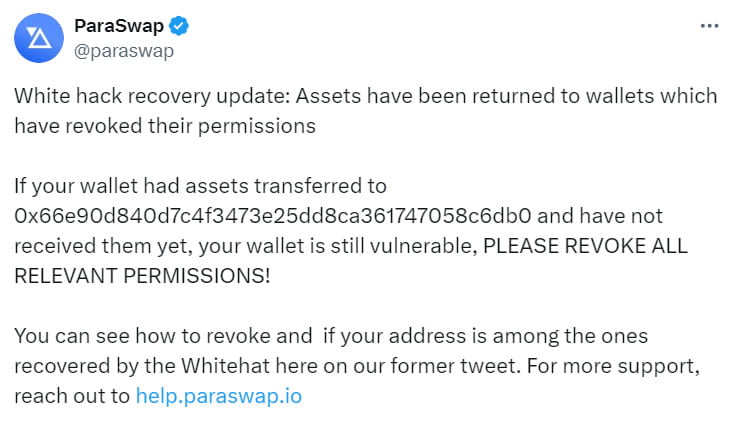The decentralized finance platform ParaSwap has begun returning users’ crypto assets after addressing a critical security flaw in its newly launched Augustus v6 smart contract last week. The DeFi platform team announced on March 24th that it had returned all assets successfully recovered by white-hat hackers to wallets and also revoked permissions granted to AugustusV6.
What’s Happening at ParaSwap?
According to ParaSwap, 213 addresses have yet to revoke their allowances related to the faulty contract. Revoking a smart contract typically involves disabling its functionality or terminating it within the blockchain ecosystem, preventing access to the user’s wallet and tokens.
Last week, ParaSwap disclosed a security vulnerability in a newly launched smart contract, but timely intervention by white-hat hackers prevented a significant loss of assets from the platform.
In a separate update, the team stated that they had taken the first step by submitting a comprehensive report to the relevant authorities and initiated an investigation into the stolen funds. ParaSwap is actively working in close collaboration with blockchain analytics and security firms Chainalysis and TRM Labs to identify hacker addresses and track the movement of funds.

Noteworthy Details of the Process
The team added that they initiated contact with the identified hacker addresses via on-chain messaging, demanding the return of stolen user funds. They stated that if the hacker does not respond by March 27th, they will assume the funds were allocated with illegal intent and will pursue all criminal, legal, and administrative avenues to recover them.
At that time, the losses were reported to be minimal, with initial findings showing that hackers made off with only $24,000 before the security flaw was discovered. ParaSwap discovered the security vulnerability in its newly launched Augustus v6 smart contract on March 20th, just a few days after its release on March 18th to improve token swaps and reduce transfer fees in the Augustus contract.
Following the discovery, the platform paused its application programming interface (API) and secured the funds through a white-hat hack.

 Türkçe
Türkçe Español
Español










